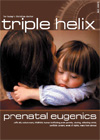Going to church may extend life
Weekly religious attendance could add years to your life, according to a medical study carried out in the US. The effects of exercise, religious attendance and anti-cholesterol drugs on life expectancy were examined. All three were found to be beneficial, with religious attendance adding two to three years to your life. The results of the research were published in the March-April issue of the Journal of the American Board of Family Medicine. (BBC News 2006; 4 April, news.bbc.co.uk
Christian Classics Ethereal Library
Hundreds of free Christian classics written through the centuries are available for free download in a variety of formats from www.ccel.org. Some extra features include hymn and chant tunes, audiobooks, searchable Bible concordances, dictionaries and foreign language assistance.
Abortion for foetal abnormality
A BBC Four TV programme broadcast on 26 April has asked whether parents of disabled children should risk bearing further children who may be disabled. John Harris, an ethicist at Manchester University, has said that we have 'moral reasons to avoid bringing inherited conditions into existence where we have that choice'. (BBC Health 2006; 26 April, news.bbc.co.uk
PVS patients awakened by sleeping pill
Zolpidem, a drug commonly used as a sleeping pill, appears to have had a miraculous effect on brain-damaged patients who have been in a permanent vegetative state for years, arousing them to the point where some are able to speak to their families, according to a paper published in the medical journal NeuroRehabilitation. The dramatic improvement occurred in three patients within 20 minutes of taking the drug, and wore off after around four hours at which point the patients returned to their permanent vegetative state. (Guardian 2006; 23 May, en.wikipedia.org
Strange encounters in lifts
Residents of the Zurich block of flats where the euthanasia clinic Dignitas has its suicide rooms have complained to the authorities about the number of corpses being moved around the building. Because coffins will not fit in the communal lift, Dignitas loads bodies into body bags to take them down to hearses in the street. Gloria Sonny, 52, who lives in the block said: 'Almost every day, the bodies of people who have chosen to kill themselves are taken down in the lift'. The controversial clinic has helped more than 450 people, including over 30 Brits, to end their lives since it opened in 1998. (Daily Record 2006; 20 May)
'Near death' has biological basis
Near death experiences have a biological explanation rather than a spiritual one, research suggests. The US team said the same parts of the brain are activated when people dream as in near death experiences. The study, in Neurology, compared 55 people who had had near death experiences and 55 who had not. Those with near death experiences were more likely to have less clearly separated boundaries between sleeping and waking, the scientists found. (BBC News 2006; 11 April, news.bbc.co.uk
Ethical stem cell bank
A new umbilical cord blood bank has been opened in Dubai. The Dubai Cord Blood and Research Centre (DCBRC) will store cord blood which is rich in stem cells and which can be used as an ethical alternative to embryonic stem cells. Researchers plan to use the cells to investigate possible cures for genetic diseases prevalent in the country such as thalassaemia and sickle-cell disease. Dr Mahmoud Taleb Al Ali, head of research at DCBRC said: 'The use of cord blood removes any ethical questions that might arise. If it's embryonic stem cells, then that is different'. (Gulf News 2006; 7 June, archive.gulfnews.com
'Perfect' babies at a price
The first 'designer baby' clinic is to be set up in Britain and £6,000 is expected to be charged for each child. The clinic will offer screening for inherited genetic disorders such as muscular dystrophy and cystic fibrosis and embryos who are carrying the genes will be destroyed. Josephine Quintavalle, of Comment on Reproductive Ethics, said, 'Paying £5 million for a state-of-the-art centre in order to eliminate more embryos with disabilities sounds like aggressive eugenics. We need to develop real cures for genetic diseases, not kill the carriers.' (Telegraph 2006; 26 March, reported in SPUC Digest)
Mothers single by choice?
The Independent has run a feature examining a recent trend for single women to set out to have babies on their own. 82,000 women in their thirties with no partner are said to give birth every year, and recent survey found that two thirds of women think it is OK for a woman to deliberately have a child alone, although 66% said that a father figure is necessary for a child's well-being. Helen Kendrew, a fertility nurse, said that, 'In their twenties women tend to put careers first and imagine that husbands and families are going to fall into line at some point... but when they get to their thirties and forties and it hasn't quite worked out like that, it can be a hell of a shock'. (Independent 2006; 21 May, reported in SPUC Digest)
More elderly abuse
A debate in the House of Commons has drawn attention to reports claiming that up to 500,000 elderly people in the UK are victims of physical, psychological, financial or sexual abuse at any one time. Government ministers were urged to take action regarding widespread malnutrition in care homes. Paul Burstow MP also highlighed the problem of mismanaged medication, claiming that up to 22,233 elderly people may be on sedation without medical grounds. (UK Parliamentary Debate 2006, 7 February, reported in SPUC Digest)
World 'lacks 4m health workers'
Four million health workers are needed to combat the 'chronic shortage' around the world, a report from the World Health Organization has warned. Fifty-seven countries have a serious shortage of health workers, affecting children's jabs, pregnancy care and access to treatment, it said. Thirty-six of these countries are in sub-Saharan Africa. The WHO's World Health Report 2006 said the shortage affected how diseases such as HIV/Aids could be tackled. (BBC News 2006; 7 April, news.bbc.co.uk































